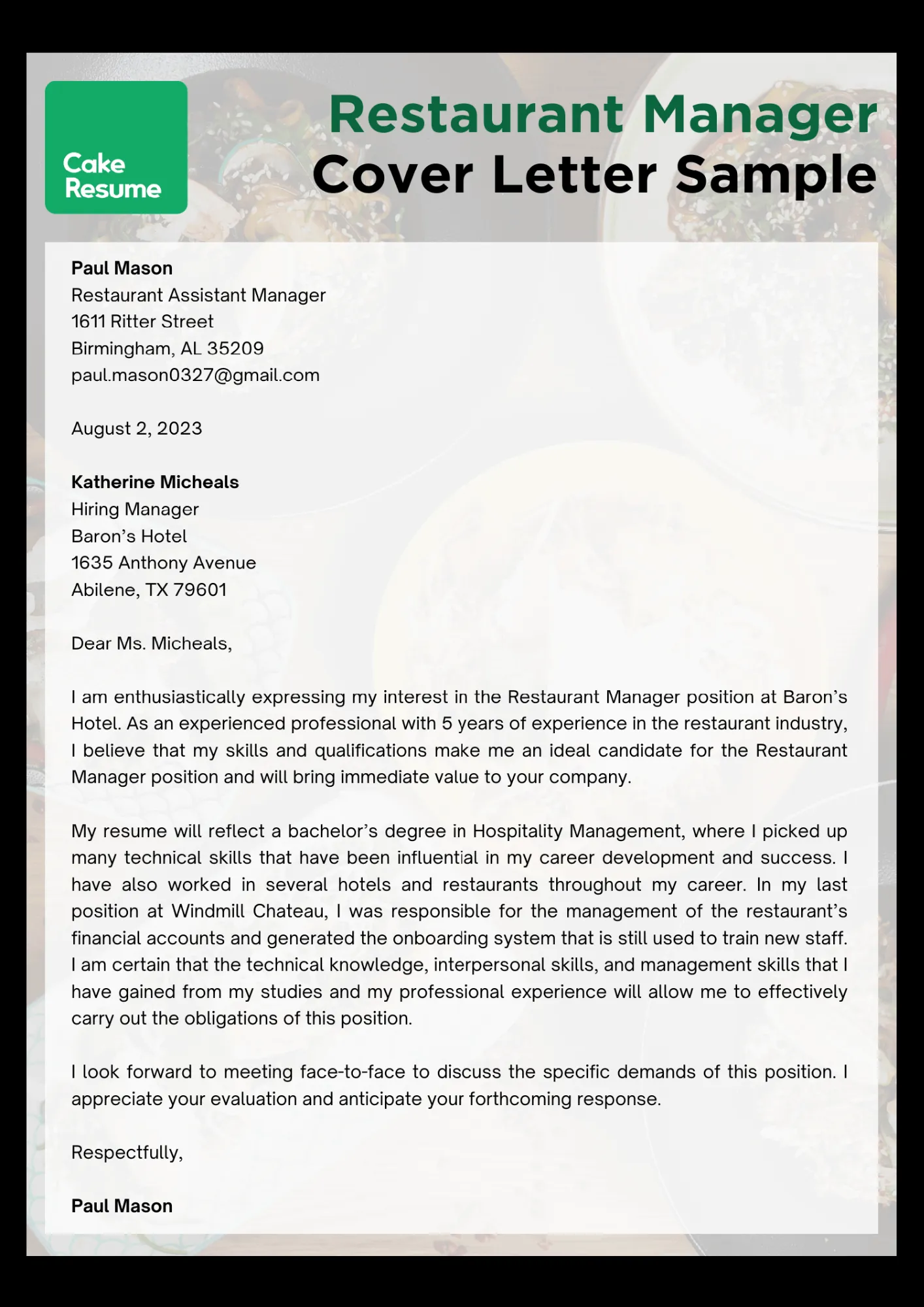What is a Restaurant Assistant Manager Cover Letter
A restaurant assistant manager cover letter is a crucial document that accompanies your resume when applying for a management position within a restaurant setting. It serves as your personal introduction to the hiring manager, providing an opportunity to showcase your relevant skills, experience, and enthusiasm for the role. Unlike a resume, which offers a factual overview of your work history, a cover letter allows you to express your personality, explain why you’re a good fit for the specific restaurant, and demonstrate your understanding of their needs. A well-crafted cover letter can significantly increase your chances of landing an interview by capturing the hiring manager’s attention and highlighting your unique qualifications.
Why You Need a Cover Letter
In the competitive world of restaurant management, a cover letter is essential for making a strong first impression. It goes beyond the basic information in your resume and allows you to personalize your application, demonstrating genuine interest in the specific restaurant and the assistant manager role. A cover letter helps you explain any gaps in your employment history, elaborate on significant achievements, and connect your skills and experience directly to the requirements outlined in the job description. Moreover, it gives you the chance to highlight your soft skills, like communication, leadership, and problem-solving, which are vital for success in a management position. Without a cover letter, your application might be overlooked, especially if other candidates have taken the time to create a compelling one.
Key Components of an Assistant Manager Cover Letter
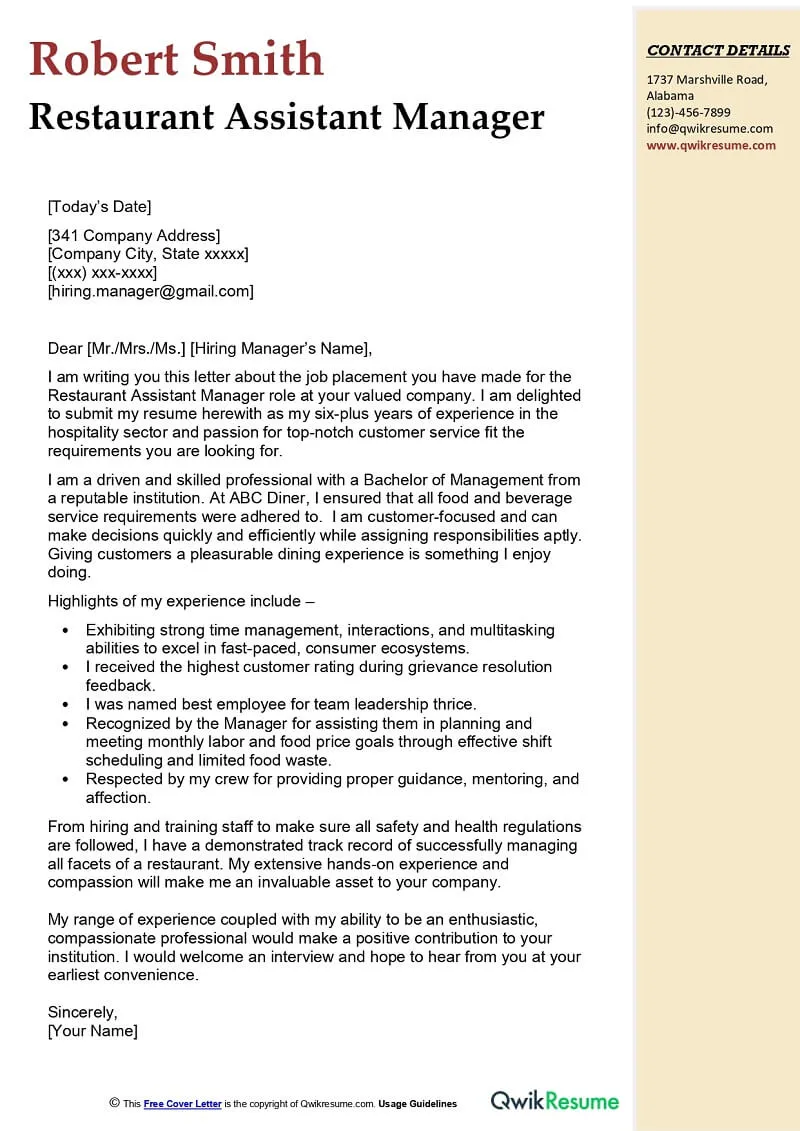
A well-structured cover letter includes several key components that work together to present a comprehensive picture of your qualifications and suitability for the role. The most common components are the contact information of both the applicant and the recipient, a personalized greeting, a compelling opening paragraph that grabs the reader’s attention, a section highlighting your relevant experience and achievements, another section emphasizing your soft skills, a demonstration of your enthusiasm for the specific restaurant and its culture, a clear call to action requesting an interview, and a professional closing with your signature. Including these components, ensuring a polished format, and proofreading meticulously before submitting will considerably improve the effectiveness of your cover letter.
Contact Information and Date
At the top of your cover letter, include your full name, address, phone number, and email address. This information ensures that the hiring manager can easily contact you. Below your contact information, include the date. It is useful for record-keeping and also shows the recruiter when the letter was written. Ensure this information is accurate and up-to-date to avoid any communication issues during the hiring process. For a professional presentation, ensure consistency in your formatting, e.g., the use of a standard font, text alignment, and spacing between the elements.
Greeting the Hiring Manager
Address the hiring manager by name whenever possible. This personalization demonstrates your interest in the role and shows that you’ve taken the time to research the company. If you’re unable to find the hiring manager’s name, you can use a professional greeting like ‘Dear Hiring Manager’ or ‘Dear [Restaurant Name] Team.’ Avoid generic greetings like ‘To Whom It May Concern’ or ‘Dear Sir/Madam,’ as they can make your cover letter appear impersonal. Research on sites like LinkedIn can help you identify the hiring manager. A personalized greeting shows you have paid attention to the company details.
Opening Paragraph Making a Strong First Impression
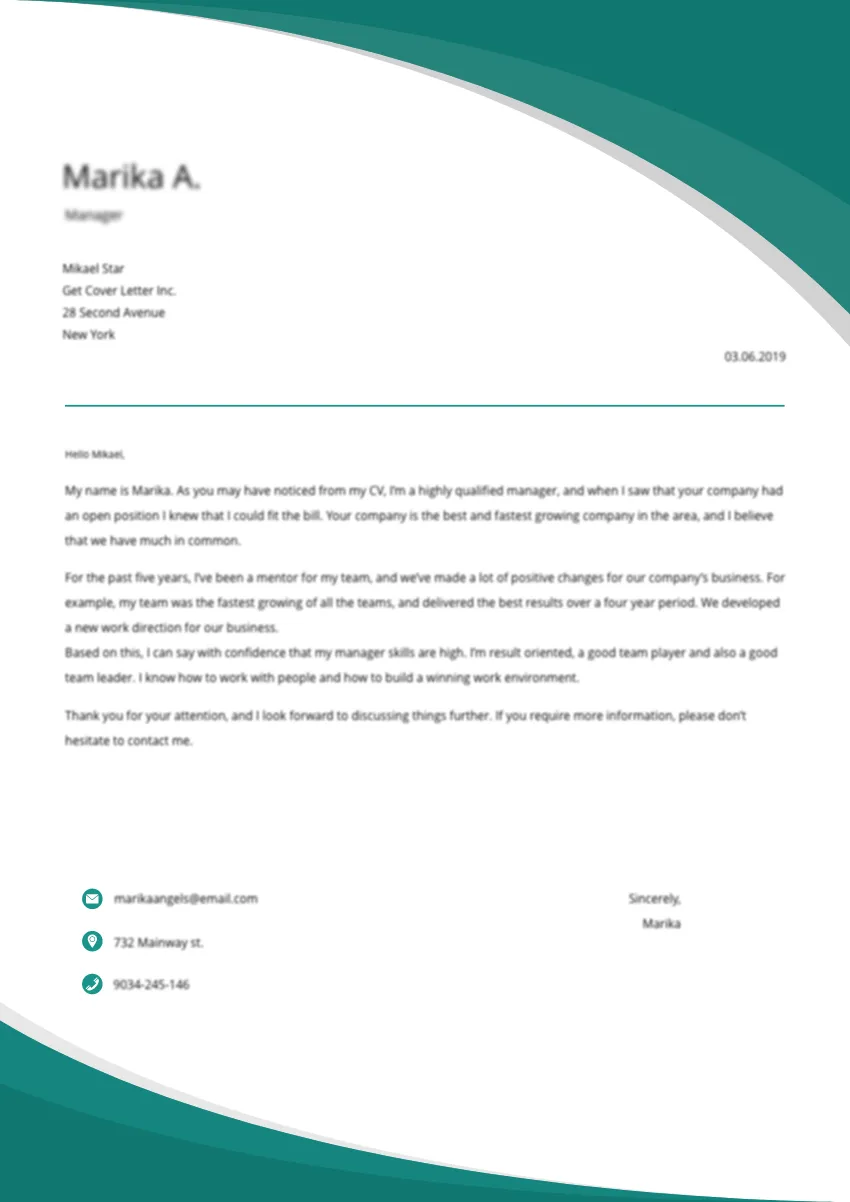
Your opening paragraph is your chance to capture the hiring manager’s attention from the start. Begin with a strong statement that grabs their interest. Consider mentioning where you saw the job posting, briefly stating your qualifications, and expressing your enthusiasm for the opportunity. Make it clear why you’re writing and what position you’re applying for. This first impression sets the tone for the rest of your cover letter, so be concise, enthusiastic, and tailored to the specific restaurant and role. Highlight what makes you unique and how your skills align with their needs. Don’t restate your resume; focus on what makes you stand out.
Highlighting Relevant Experience
The body of your cover letter should focus on highlighting your relevant experience. Select your most significant accomplishments and tailor them to the job description’s requirements. Explain how your previous roles have prepared you for the assistant manager position, focusing on transferable skills like leadership, customer service, and operational efficiency. Include specific examples and avoid simply listing your job duties; instead, showcase your achievements and contributions. Quantify your accomplishments whenever possible, such as by stating the percentage increase in sales you achieved or the number of employees you managed. By focusing on achievements, you immediately demonstrate your value to a prospective employer.
Quantifying Achievements
Quantifying your achievements is an effective way to make your cover letter more impactful. Instead of simply stating that you improved customer service, provide specific data, such as ‘Increased customer satisfaction scores by 15% within six months.’ Use numbers and metrics to illustrate the results you’ve achieved in previous roles. For example, if you managed inventory, mention how you ‘Reduced food costs by 10% through effective inventory management and waste reduction strategies.’ Quantifying your achievements adds credibility to your claims and helps the hiring manager understand the value you bring to the table. Focus on the metrics that are important to the restaurant and align with the job description.
Showcasing Soft Skills
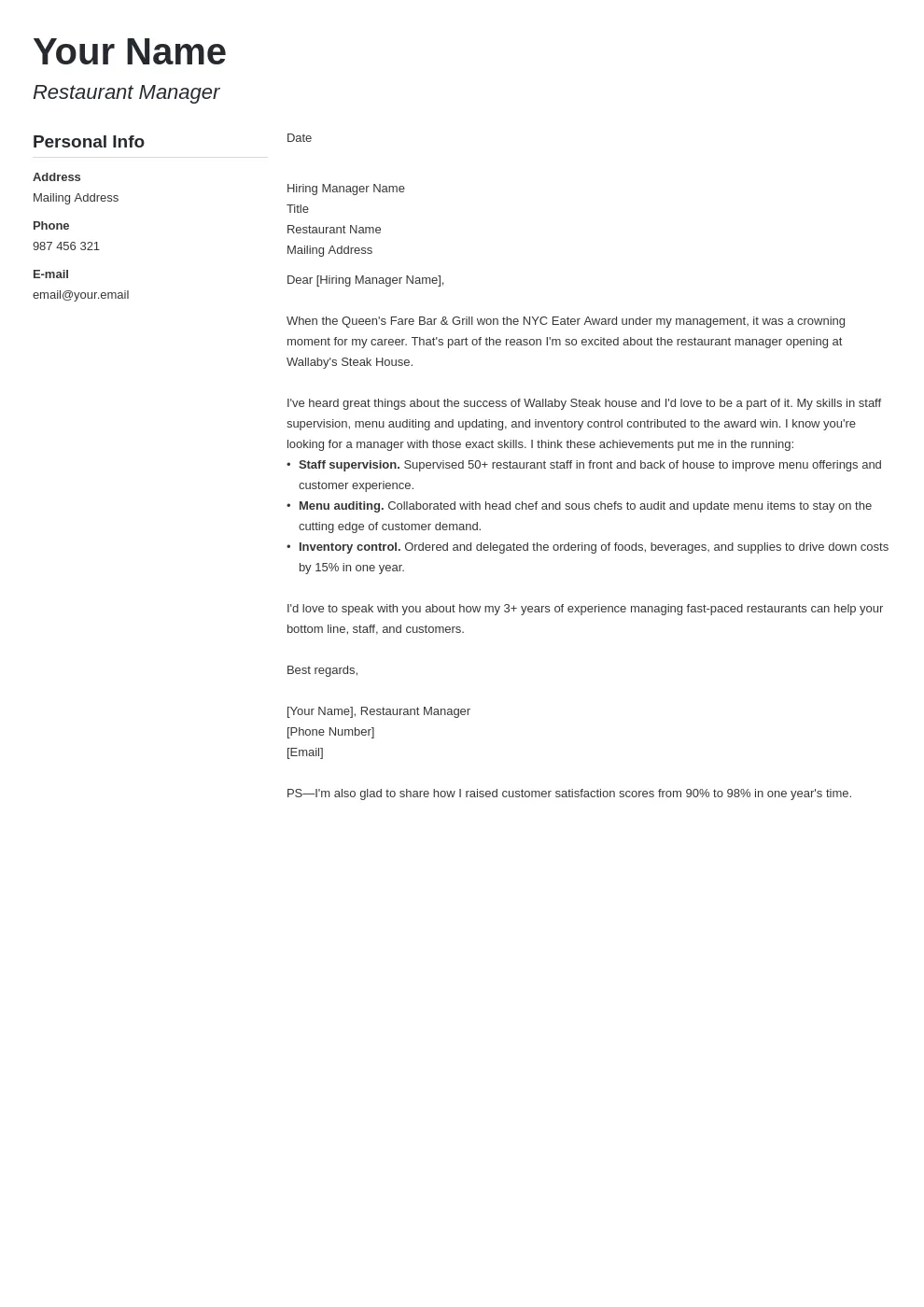
In addition to hard skills, like inventory management, emphasize your soft skills, which are essential for a successful assistant manager. These include leadership, communication, problem-solving, conflict resolution, and teamwork. Provide examples of how you’ve demonstrated these skills in previous roles. For instance, describe a situation where you effectively resolved a customer complaint or led a team to achieve a specific goal. Soft skills demonstrate your ability to work well with others, handle difficult situations, and contribute to a positive work environment. Tailor your examples to match the restaurant’s values and culture, demonstrating how your skills align with their needs.
Expressing Enthusiasm and Company Knowledge
Demonstrate your genuine interest in the restaurant by expressing your enthusiasm and showing that you’ve researched the company. Mention specific aspects of the restaurant that appeal to you, such as its reputation, menu, atmosphere, or commitment to customer service. Explain why you want to work there and how your values align with the company’s mission. This personalization shows that you’re not just applying for any job; you genuinely want to be part of their team. Research the restaurant’s history, current initiatives, and any recent news or reviews. This knowledge shows that you are proactive and interested in the restaurant’s success.
Call to Action Requesting an Interview
Conclude your cover letter with a clear call to action, requesting an interview. State your availability and express your eagerness to discuss your qualifications further. Make it easy for the hiring manager to contact you by reiterating your phone number and email address. Thank the hiring manager for their time and consideration. A strong call to action encourages them to move forward with your application. Be confident and enthusiastic in your request, but keep it professional and concise. Ensure your closing is polite and leaves a positive lasting impression.
Closing and Formal Sign-off
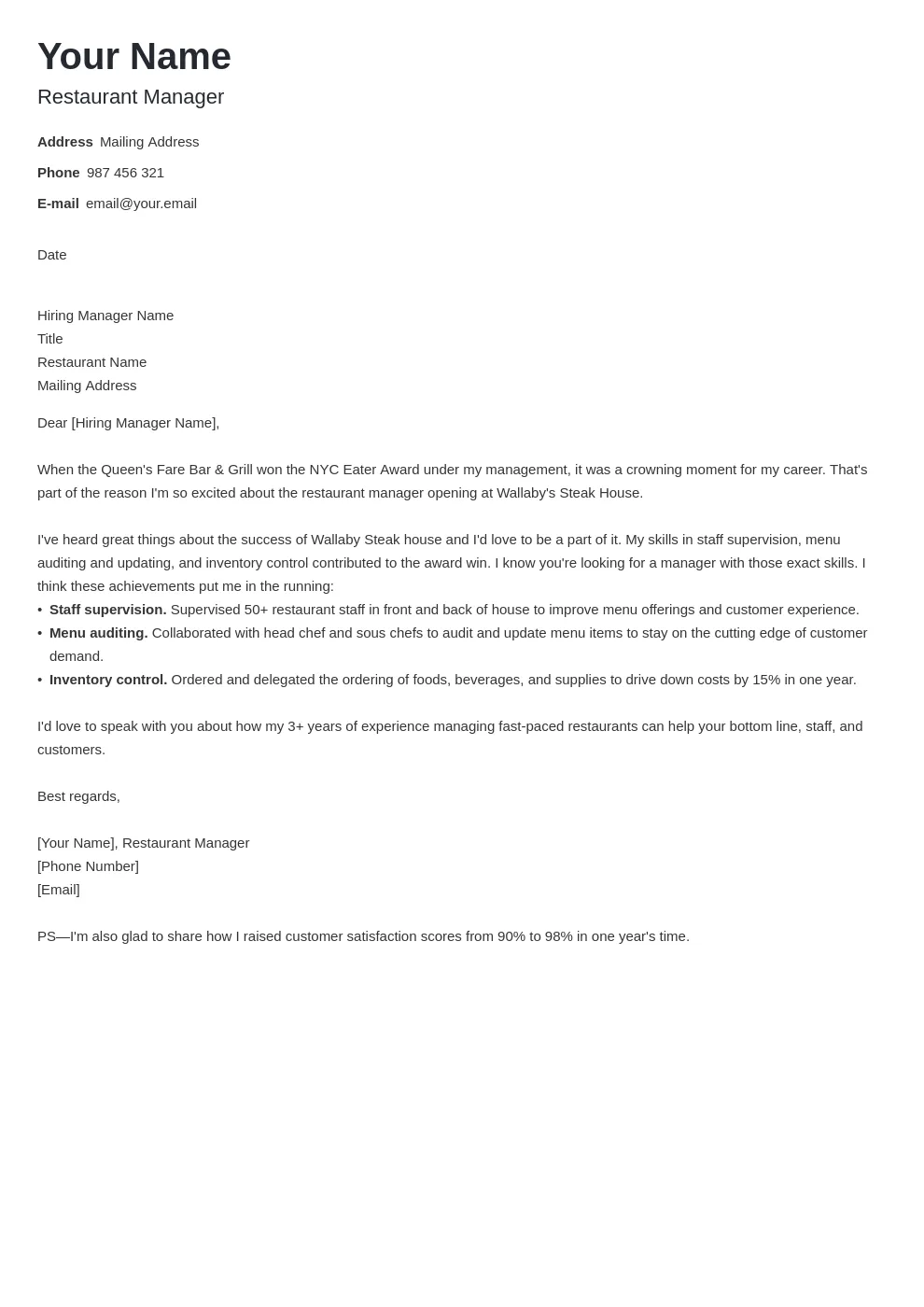
End your cover letter with a professional closing, such as ‘Sincerely,’ ‘Best regards,’ or ‘Thank you.’ Ensure your signature is included below the closing, either typed or scanned if you are submitting a physical letter. Provide your full name below your signature. Make sure your closing aligns with the overall tone of your letter. For digital submissions, your electronic signature can serve as an effective alternative. Review the formatting and ensure that everything is properly aligned and easy to read. By including a strong closing, you maintain professionalism until the end and highlight your interest in the position.
Proofreading and Formatting
Before submitting your cover letter, carefully proofread it for any grammatical errors, spelling mistakes, and typos. Ask a friend or family member to review it as well, as a fresh pair of eyes can often catch mistakes that you might miss. Ensure your cover letter is well-formatted and easy to read. Use a professional font like Times New Roman, Arial, or Calibri, and maintain a consistent font size and spacing. Keep the letter concise, ideally one page long, and use clear, concise language. Ensure proper sentence structure and grammar to make a professional presentation. A well-formatted and error-free cover letter demonstrates your attention to detail and professionalism.
Common Mistakes to Avoid
Avoiding common mistakes can significantly improve your cover letter’s effectiveness. Ensure your cover letter is polished before submitting it. These mistakes can negatively impact your application. Focusing on the positive aspects of your candidacy and avoiding these pitfalls can significantly enhance your chances of success.
Overusing Clichés
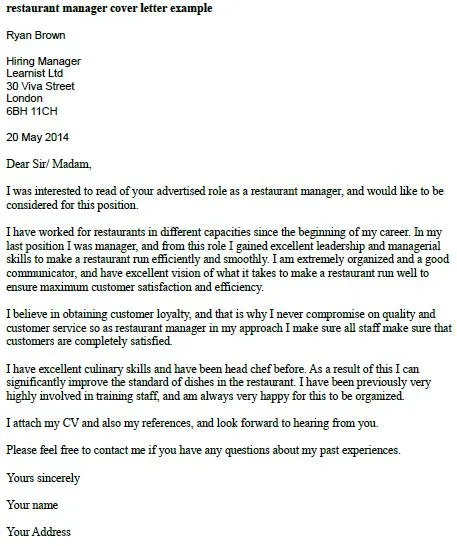
Avoid using generic phrases and clichés like ’team player’ or ‘hard worker.’ These overused terms don’t provide any specific information about your skills or qualifications. Instead, provide concrete examples of your achievements and contributions. Use action verbs and specific details to show what you have done rather than telling the hiring manager. The aim is to write a letter that demonstrates your individuality and is also captivating. Tailor each cover letter to the specific restaurant and position.
Focusing Solely on Responsibilities
Rather than simply listing your job responsibilities, focus on your achievements and how you’ve made a positive impact in previous roles. Highlight your accomplishments using quantifiable results and specific examples. Showing what you have achieved is more effective than describing your daily tasks. For example, describe how you improved customer satisfaction scores or reduced operating costs. Focus on what makes you stand out and the value you can bring to the company. This will help the hiring manager understand your capabilities and see how you can benefit their business.
Ignoring the Company Culture
Avoid a generic cover letter and demonstrate that you understand the restaurant’s culture and values. Research the restaurant’s mission, values, and any recent news or reviews. Tailor your cover letter to show how your skills and experiences align with their specific needs. If the restaurant emphasizes customer service, highlight your customer service skills and provide relevant examples. Personalize your letter to show you understand their brand and are excited to be a part of their team. Demonstrate this understanding to grab the hiring manager’s attention immediately. Showing a genuine interest in their restaurant will set you apart.
Tips for Tailoring Your Cover Letter
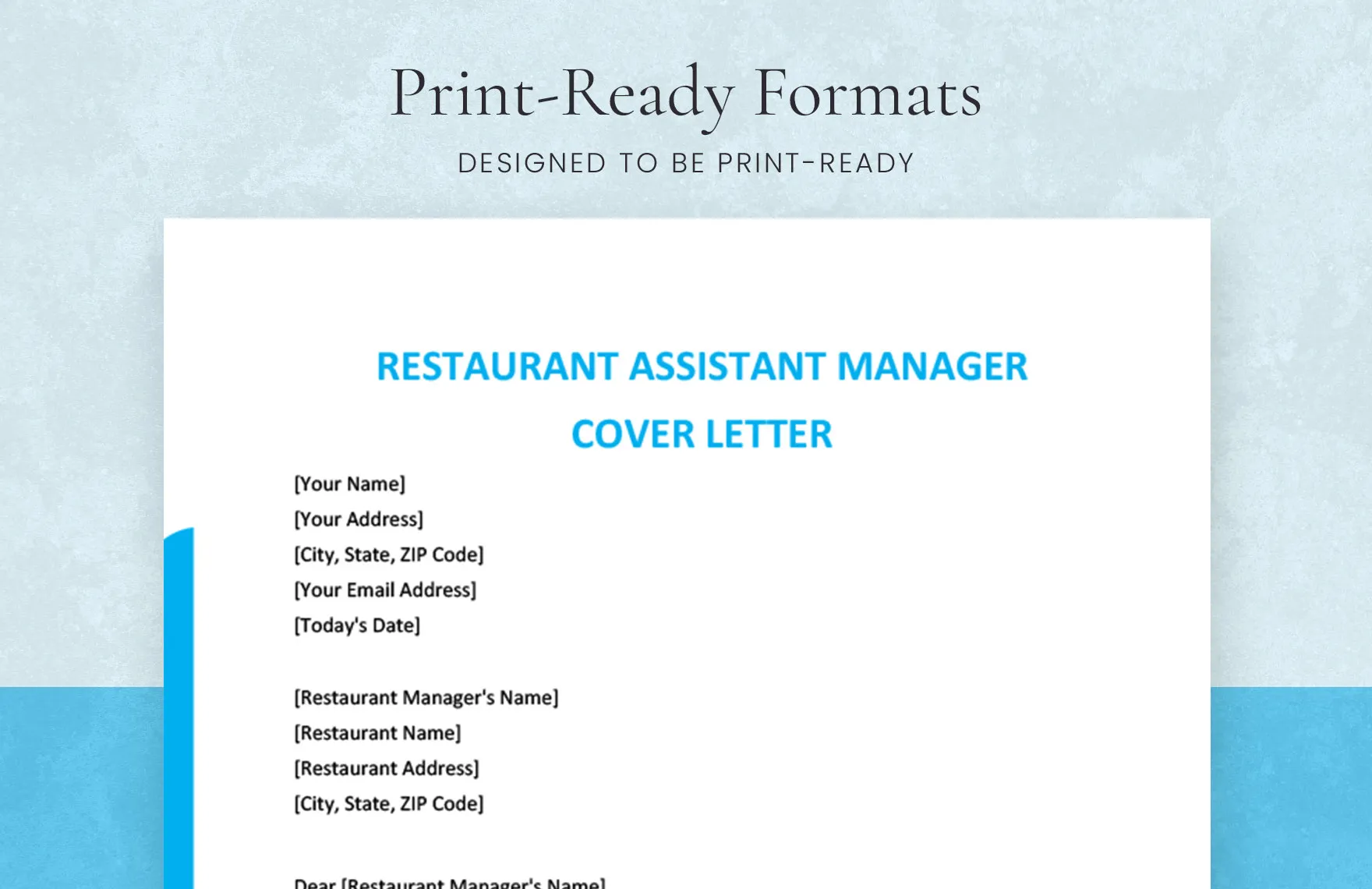
Tailoring your cover letter to each specific job application is essential for maximizing your chances of success. Tailoring demonstrates your sincere interest in the specific role and your understanding of the restaurant’s requirements. Here’s a guide on how to adapt the cover letter to get the best outcome.
Researching the Restaurant
Before writing your cover letter, thoroughly research the restaurant. Visit their website, read reviews, and, if possible, dine at the restaurant to experience the atmosphere and service firsthand. This research will help you understand their values, mission, and target audience. Use this knowledge to tailor your cover letter by mentioning specific aspects of the restaurant that appeal to you and showcasing how your skills align with their needs. Understanding the company will help your cover letter to stand out and impress the hiring manager.
Matching Skills to Job Requirements
Carefully review the job description and identify the key skills and qualifications the restaurant is seeking. Highlight your skills and experience that directly align with those requirements. Use the same keywords and phrases from the job description to show that you’re a good match for the role. Provide specific examples of how you’ve demonstrated those skills in previous roles. This alignment between your skills and the job requirements will demonstrate your suitability for the position and increase your chances of getting an interview. Tailor the emphasis in your cover letter, matching what is most significant in the job posting.
Using Keywords from the Job Description
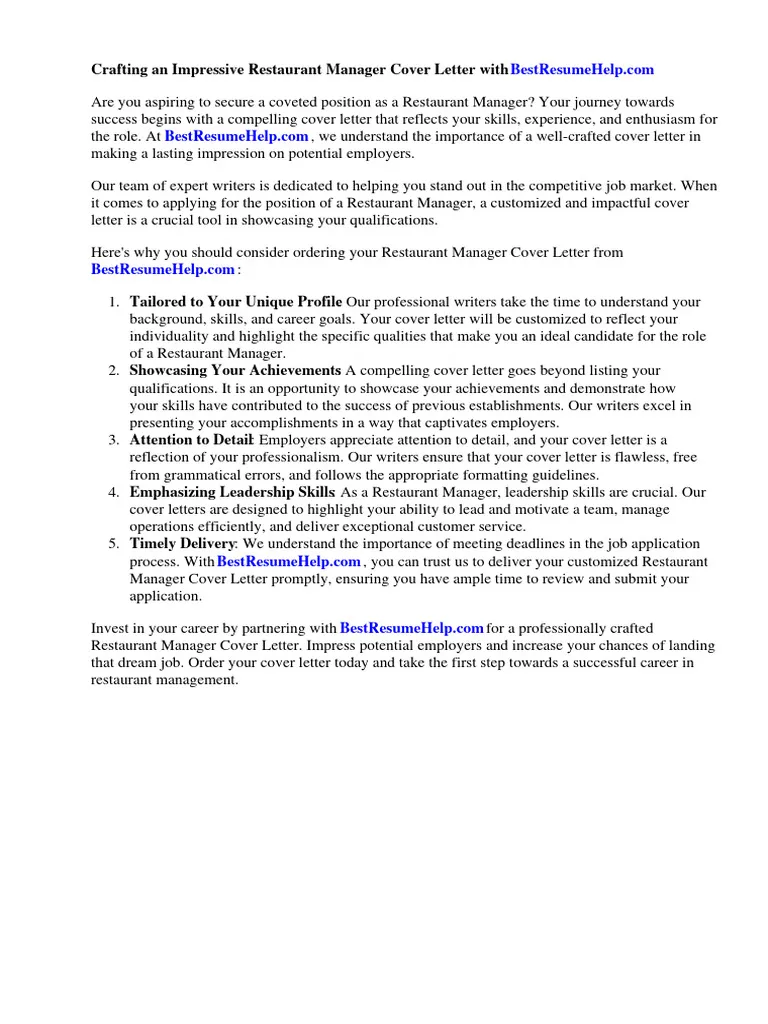
Incorporate keywords from the job description throughout your cover letter. Keywords are terms that describe the skills, experience, and qualifications the employer is looking for. Carefully examine the job description and identify these keywords. Use these keywords naturally within your sentences when describing your skills and experience. This will help your cover letter pass through Applicant Tracking Systems (ATS) and ensure that your application is seen by the hiring manager. However, avoid keyword stuffing, which can make your letter sound unnatural and difficult to read. A natural and thoughtful inclusion of keywords shows that you understand the needs of the role.
Formatting Your Cover Letter for Impact
The formatting of your cover letter impacts how the recruiter will read the information. Ensure your cover letter is organized and well-formatted to improve readability. Proper formatting will show you are attentive to detail and present yourself professionally. Use formatting to organize and showcase the essential information.
Choosing the Right Font
Select a professional and easy-to-read font for your cover letter. The best choices include Times New Roman, Arial, Calibri, or Helvetica. These fonts are standard and widely accepted in professional correspondence. The font size should typically be between 10 and 12 points. Ensure consistency in font choice throughout the document. This will ensure that your cover letter looks polished and is easy for the hiring manager to read. Avoid any fancy or overly stylized fonts, as they can be distracting or difficult to read. Professional and readable fonts make the letter more engaging.
Using White Space Effectively
Use white space strategically to improve the readability of your cover letter. White space refers to the blank areas between paragraphs, lines, and sections of text. Include spaces between each paragraph to separate your ideas. Use short paragraphs to prevent the letter from looking cluttered. Use clear spacing around the headings and other important elements. The right amount of white space prevents the letter from appearing overwhelming and gives the hiring manager’s eyes a break. Effective use of white space makes the cover letter look clean and professional, and enables the recruiter to quickly digest the essential information.
Keeping it Concise
Keep your cover letter concise and to the point. Aim for one page in length, and avoid unnecessary details or long, complex sentences. Focus on your key qualifications and achievements. Use clear and straightforward language. Eliminate any unnecessary words or phrases. A concise cover letter demonstrates your ability to communicate effectively and respect the hiring manager’s time. Hiring managers often have many applications to review, and they will appreciate a cover letter that gets straight to the point. Prioritize information that will make the most impact.
Restaurant Assistant Manager Cover Letter Examples
Reviewing examples can offer you insight into the kind of content that will give the best results. These examples can help you understand the format and content. Here are a few examples.
Example 1 Focusing on Leadership
Dear [Hiring Manager Name],
I am writing to express my interest in the Assistant Manager position at [Restaurant Name], as advertised on [Platform]. With over five years of experience in restaurant management, I am confident in my ability to lead and motivate a team to deliver exceptional service and achieve operational excellence.
In my previous role at [Previous Restaurant Name], I successfully led a team of 20+ employees, consistently exceeding sales targets by an average of 10% per quarter. I implemented new training programs that improved staff performance and reduced employee turnover by 15%. My strong leadership skills were also essential in the rapid resolution of customer complaints, resulting in an increase of positive online reviews by 20%.
I am very excited about the opportunity to contribute my skills and passion to [Restaurant Name]. My proven track record, alongside my unwavering focus on team development and customer satisfaction, aligns perfectly with the values of your establishment. I would greatly appreciate the chance to discuss my qualifications further in an interview. Thank you for your time and consideration.
Sincerely, [Your Name]
Example 2 Highlighting Customer Service
Dear [Hiring Manager Name],
I am writing to express my interest in the Assistant Manager position at [Restaurant Name]. I have a genuine passion for delivering exceptional customer service, and I am eager to apply my skills to enhance the guest experience at your establishment.
In my role at [Previous Restaurant Name], I was consistently recognized for my ability to resolve customer issues effectively and create a welcoming environment. I implemented new customer service protocols that increased customer satisfaction scores by 18% within six months. I also trained and mentored the service staff, ensuring all staff members understood the importance of providing attentive and personalized service. I am adept at handling customer feedback and addressing issues promptly.
I am truly impressed by [Restaurant Name]’s reputation for providing outstanding service. I am excited about the prospect of contributing to this exceptional reputation. I welcome the opportunity to discuss my qualifications in more detail.
Sincerely, [Your Name]
Example 3 Emphasizing Operational Efficiency
Dear [Hiring Manager Name],
I am writing to express my keen interest in the Assistant Manager position at [Restaurant Name]. With a proven track record of improving operational efficiency and profitability, I am confident in my ability to contribute to your restaurant’s success.
In my previous role at [Previous Restaurant Name], I implemented inventory management strategies that reduced food costs by 12% and minimized waste. I streamlined labor scheduling, resulting in a 8% reduction in labor costs while maintaining high levels of service quality. I managed all aspects of restaurant operations, including staff training, inventory control, and customer service. I am proficient in using POS systems, managing budgets, and ensuring compliance with health and safety regulations.
I am particularly drawn to [Restaurant Name]’s commitment to quality and efficiency. I am excited to apply my skills to further improve your operational performance. I would welcome the chance to discuss my qualifications further in an interview.
Sincerely, [Your Name]
Frequently Asked Questions Cover Letters
Job seekers often have questions about the format and content. This FAQ provides answers to some of the most frequently asked questions related to restaurant assistant manager cover letters. Addressing these frequently asked questions is a helpful step to create an effective cover letter.
How long should my cover letter be
Your cover letter should ideally be one page long. Focus on highlighting your most relevant skills and experiences. Keep it concise and to the point to respect the hiring manager’s time. The goal is to make a positive impact without overwhelming the reader. Long, rambling letters can diminish the effectiveness of your application. The hiring manager should easily read the letter.
What tone should I use in my cover letter
Maintain a professional and enthusiastic tone throughout your cover letter. Express your excitement for the role and the restaurant. Highlight your skills and experience in a confident but not arrogant manner. Demonstrate your personality and passion, which can help you stand out. The language should be clear, concise, and easy to understand. Tailor your tone to fit the restaurant’s culture if possible, but remain professional. Your tone must reflect your sincerity and interest in the position.
Should I include references in my cover letter
Generally, it is not necessary to include references in your cover letter. Instead, you can state that references are available upon request. Include your references on a separate document to provide when requested. This keeps your cover letter concise and focused on your qualifications and experience. By waiting until the employer requests references, you ensure that your references are current and that you are following their specific application instructions.
